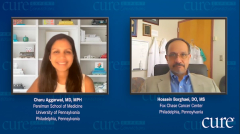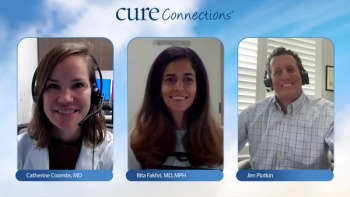
Novel-Based Treatment Approaches in NSCLC
Advances in non-small cell lung cancer that have helped lung oncologists make more informed treatment decisions with patients.
Episodes in this series

Charu Aggarwal, M.D., MPH: Hello, and welcome to CURE Expert Connections®. I’m Dr. Aggarwal from the University of Pennsylvania. I’d like to welcome my colleague and dear friend, Dr. Borghaei, from the Fox Chase Cancer Center. Today we’re going to discuss advanced non-small cell lung cancer. We’ll address the importance of biomarker testing, patients living with advanced lung cancer, and the role of the caregiver. Welcome, Hoss. And welcome, everyone.
Hossein Borghaei, DO, MS: Thank you. It’s great to be here. Thanks for the invitation. I’m looking forward to this conversation with you.
Charu Aggarwal, M.D., MPH: Absolutely. Non-small cell lung cancer has rapidly changed in the last 10 to 15 years. We now have several different targeted therapies. We have ways to look for patients who may be candidates for targeted therapy. But not only that, we now have very effective immunotherapeutic strategies and have learned how to combine chemotherapy and immunotherapy.
Needless to mention, we are also diagnosing patients slightly earlier. We have better guidance on low-dose screening for lung cancer. Recently, we expanded our reach on eligible patients for low-dose screening. I find that today, compared to even one or two years ago, our ability to use prognostic and predictive biomarkers to guide treatment has immensely increased. Patients are coming to us from various different subspecialties. While at the University of Pennsylvania we tend to see more patients referred to us from the interventional pulmonary clinic, Hoss, what does a patient’s journey look like at your center? What percentage of patients usually progress to advanced disease at your center?
Hossein Borghaei, DO, MS: Thanks, Charu. As you mentioned, since we are at a referral center, patients have several different ways of accessing us and coming in. We get direct referrals, meaning patients can call and ask for an appointment to be seen and evaluated. We have nurse navigators, like a majority of academic places and some nonacademic places now have, to help the patient with the process of getting an appointment in a timely fashion. Our pulmonary and surgical colleagues sometimes refer patients. Because of the clinical trials’ ability, we have referrals from colleagues around us who have patients who are potentially eligible for studies for us to evaluate. The bottom line is that our goal is to try to provide access as much as possible in as timely a manner as possible with the lowest amount of burden on patients in terms of collection of material and all that.
In that category, having access to electronic medical records, the way we now do for the most part in the state [of Pennsylvania], has been very helpful. We have access to a lot of things that are available electronically. The patient’s journey depends on what stage of evaluation the patient requires. Somebody who hasn’t been treated or doesn’t have a biopsy goes into a more urgent pool of patients. Those who are on treatment and potentially seeking future trials and drug development protocols are a different pool. But the goal here is to bring everyone in for these evaluations in a timely fashion. Much like what you referred to, everybody has to have molecular testing. We either do a liquid biopsy panel or a tumor biopsy, or a combination of both—hopefully we get to talk about that, using your experience and expertise in the liquid biopsy area—and getting other biomarkers, such as PD-L1, to decide whether we have appropriate treatment options or trials for our patients. It’s a complicated process, but the goal is to make it as easy as we can on patients who are in need of these evaluations.
Transcript edited for clarity.

